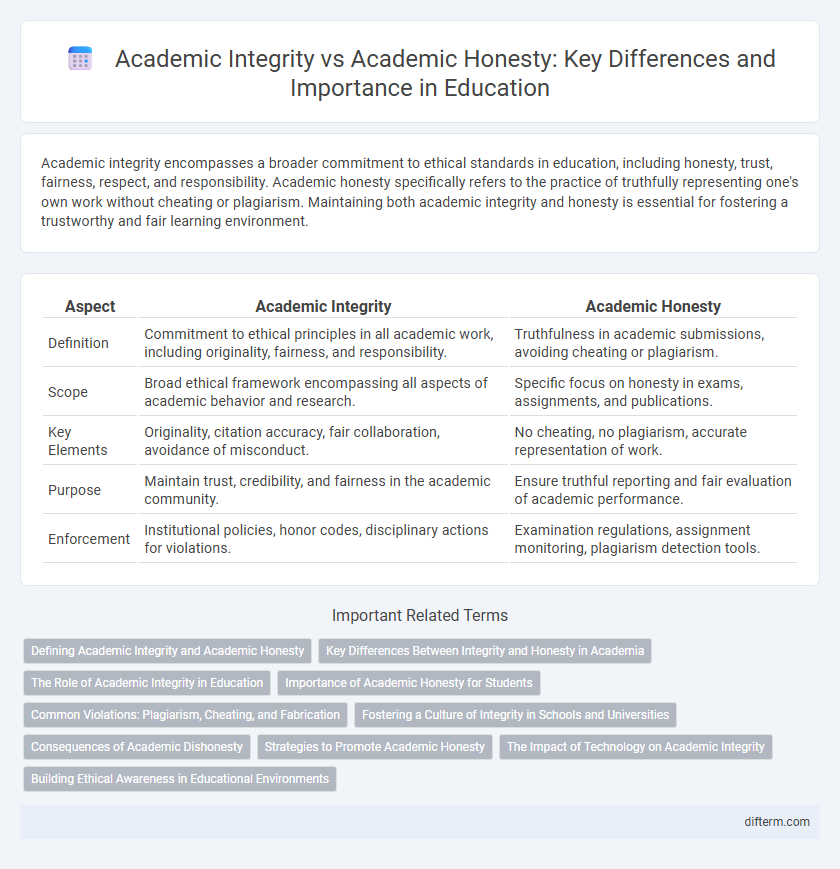Academic integrity encompasses a broader commitment to ethical standards in education, including honesty, trust, fairness, respect, and responsibility. Academic honesty specifically refers to the practice of truthfully representing one's own work without cheating or plagiarism. Maintaining both academic integrity and honesty is essential for fostering a trustworthy and fair learning environment.
Table of Comparison
| Aspect | Academic Integrity | Academic Honesty |
|---|---|---|
| Definition | Commitment to ethical principles in all academic work, including originality, fairness, and responsibility. | Truthfulness in academic submissions, avoiding cheating or plagiarism. |
| Scope | Broad ethical framework encompassing all aspects of academic behavior and research. | Specific focus on honesty in exams, assignments, and publications. |
| Key Elements | Originality, citation accuracy, fair collaboration, avoidance of misconduct. | No cheating, no plagiarism, accurate representation of work. |
| Purpose | Maintain trust, credibility, and fairness in the academic community. | Ensure truthful reporting and fair evaluation of academic performance. |
| Enforcement | Institutional policies, honor codes, disciplinary actions for violations. | Examination regulations, assignment monitoring, plagiarism detection tools. |
Defining Academic Integrity and Academic Honesty
Academic integrity encompasses the full commitment to ethical principles in education, including honesty, trust, fairness, respect, and responsibility. Academic honesty specifically refers to the practice of truthfulness and avoiding cheating, plagiarism, and other forms of academic misconduct. Both concepts ensure the credibility of educational achievements and uphold the value of scholarly work.
Key Differences Between Integrity and Honesty in Academia
Academic integrity encompasses the broader ethical framework that guides truthful, responsible conduct in educational environments, including adherence to institutional policies and the commitment to original work. Academic honesty specifically refers to the act of being truthful in one's work, such as avoiding plagiarism and cheating. The key difference lies in integrity's comprehensive scope of ethical behavior, whereas honesty is focused on truthful actions within academic tasks.
The Role of Academic Integrity in Education
Academic integrity in education ensures the commitment to ethical scholarly practices, maintaining trust between students, educators, and institutions, while academic honesty specifically addresses the avoidance of cheating and plagiarism. Upholding academic integrity fosters a culture of fairness, responsibility, and respect, which is essential for authentic learning and credible assessment outcomes. Institutions with strong academic integrity policies promote critical thinking and intellectual growth, safeguarding the value of academic credentials.
Importance of Academic Honesty for Students
Academic honesty is crucial for students as it fosters trust, enhances learning, and ensures fair evaluation. Upholding academic integrity prevents plagiarism, promotes original thinking, and strengthens the value of educational qualifications. Emphasizing honest practices prepares students for ethical challenges in their professional and personal lives.
Common Violations: Plagiarism, Cheating, and Fabrication
Academic integrity encompasses a broader commitment to ethical principles in education, while academic honesty specifically refers to the truthful representation of one's work. Common violations include plagiarism, which involves presenting someone else's ideas without proper credit; cheating, such as using unauthorized materials during exams; and fabrication, where false data or information is intentionally created. Upholding both academic integrity and honesty is critical to maintaining trust, fairness, and the value of educational achievements.
Fostering a Culture of Integrity in Schools and Universities
Fostering a culture of integrity in schools and universities involves promoting both academic integrity and academic honesty as foundational principles. Academic integrity encompasses a broader commitment to ethical scholarship, including originality, proper citation, and avoidance of misconduct, while academic honesty specifically addresses truthfulness in completing assignments and exams. Implementing honor codes, integrity workshops, and transparent assessment policies helps cultivate environments where students value trust, responsibility, and fairness in their academic pursuits.
Consequences of Academic Dishonesty
Academic dishonesty, including plagiarism and cheating, undermines the credibility of educational institutions and devalues genuine student achievements. Consequences range from failing grades and suspension to expulsion, significantly impacting students' academic and professional futures. Institutions often implement strict policies and use plagiarism detection tools to preserve academic integrity and maintain trust in educational outcomes.
Strategies to Promote Academic Honesty
Implementing clear policies and consistent enforcement serves as a foundational strategy to promote academic honesty in educational institutions. Integrating educational programs on the importance of ethical behavior alongside the use of plagiarism detection tools enhances students' understanding and accountability. Cultivating a culture of trust and transparency encourages students to embrace academic integrity as a core value throughout their educational journey.
The Impact of Technology on Academic Integrity
Technology has transformed academic integrity by introducing sophisticated tools for plagiarism detection, ensuring original work and reducing academic dishonesty. However, the rise of online resources and digital collaboration also challenges enforcement, as students may unintentionally or deliberately misuse information. Educational institutions must continuously adapt policies and promote digital literacy to maintain a culture of academic honesty in a technology-driven environment.
Building Ethical Awareness in Educational Environments
Academic integrity encompasses a broader commitment to ethical principles in learning, emphasizing honesty, trust, fairness, respect, and responsibility among students and educators. Academic honesty specifically refers to the practice of avoiding cheating, plagiarism, and other dishonest behaviors in assignments and assessments. Building ethical awareness in educational environments involves integrating discussions on both academic integrity and honesty into curricula, fostering a culture where students understand the value of original work and the consequences of unethical behavior.
academic integrity vs academic honesty Infographic

 difterm.com
difterm.com